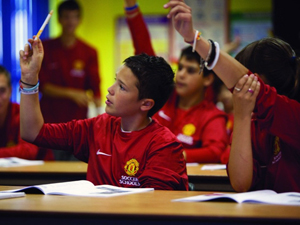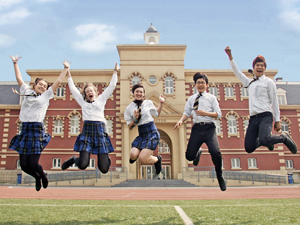Education in english boarding schools.
.jpg) Study English at a private school is a perfect base for Higher education in the UK. The sooner your child adapts, begins to learn English and adjusts to local customs and traditions the better their potential for success in the future. If you wish to see your child among the students of English schools then we can help with difficulties you may encounter, from acquiring the correct documentation to choosing the right school. We can provide an understanding to ensure mistakes are avoided. For example we can help choose a school which will meet your expectations and aid your child’s chances in success. We can also ensure the application process runs smoothly so as to enter the academic year at the right moment.
Study English at a private school is a perfect base for Higher education in the UK. The sooner your child adapts, begins to learn English and adjusts to local customs and traditions the better their potential for success in the future. If you wish to see your child among the students of English schools then we can help with difficulties you may encounter, from acquiring the correct documentation to choosing the right school. We can provide an understanding to ensure mistakes are avoided. For example we can help choose a school which will meet your expectations and aid your child’s chances in success. We can also ensure the application process runs smoothly so as to enter the academic year at the right moment.
At Pearl of Albion our knowledge and experience will save frustration and help avoid unexpected situations.
- We can advise by phone or via Skype, answering any question about schools in England for example application forms enquiries and questions about learning processes and living conditions. We also give full information about the requirements of English schools imposed on incoming students;
- We provide several options, according to the requirements of your child. We also check the availability of selected schools;
- To make your child feel comfortable in a foreign country, we help find a worthy guardian who will act as a parent throughout the educational process, if necessary speaking the mother tongue of the child who will go to parent-teacher conferences, help a child with shopping, and represent your interests in the school. Acquirement of an official guardian is a requirement for boarding schools in England.
- We will assist you in the registration of the selected school.
ending your child to study in England is not difficult or risky with the help of our specialists and organisation.
**We check the situation in schools at the time of receiving your application to make sure we select the best and most suitable option for your child.
Education in english boarding schools: useful information for parents.
Compulsory education for children in England begins at the age of 5 years old after Nursery school. Children at such a young age have to be dressed in uniforms, each school having their own colour scheme and school emblems. At this first school they will be studying until the age of 12 finishing in a 6th form class where they are taught Mathematics, English, and become more deeply acquainted with Biology, Geography, Anatomy, etc.
 At the end of the first school, at the age of 12 children move to a higher school (secondary school) which caters for up to 16 years of age from seventh to eleventh grade. Here, the core subjects are Mathematics, English and Science (covering Biology, Chemistry and Physics). The student chooses extra subjects which might be History, Geography, Religion, Art etc. Depending on the choice of each student, an individual schedule is made. In the tenth and eleventh grades the passing of ’GCSE’ exams is very important. This is the equivalent to the 9th grade exam in a Russian school. English, Mathematics and Science is compulsory, other subjects are dealt at the request of the student. Upon finishing the last year at school, the student faces a choice: either to study at college and acquire a professional qualification or, if your child wants to go to University, to stay in school for a further 2 years.
At the end of the first school, at the age of 12 children move to a higher school (secondary school) which caters for up to 16 years of age from seventh to eleventh grade. Here, the core subjects are Mathematics, English and Science (covering Biology, Chemistry and Physics). The student chooses extra subjects which might be History, Geography, Religion, Art etc. Depending on the choice of each student, an individual schedule is made. In the tenth and eleventh grades the passing of ’GCSE’ exams is very important. This is the equivalent to the 9th grade exam in a Russian school. English, Mathematics and Science is compulsory, other subjects are dealt at the request of the student. Upon finishing the last year at school, the student faces a choice: either to study at college and acquire a professional qualification or, if your child wants to go to University, to stay in school for a further 2 years.
However, even at college, the student must meet the criteria with high enough GCSE exams grades.
Students take four to five subjects which are taught in depth to grades 12 to 13 to pass a very important ‘A’ level exam, the results of which are considered when applying for the chosen University. An alternative to an A level qualification is an ‘IB’ (international Baccalaureate) if a student wishes to study at a University abroad.
 In England there are schools for boys only, girls only and mixed. There are schools with a bias to instil certain skills such as learning to ride a horse and sports selections. You have the opportunity to choose the location of the school in accordance of either within the city with a developed infrastructure, or standing alone in the countryside, as with a private guest house. Academic years usually start in the first week of September and continue until the end of June the next year, but each school works to its own schedule and curriculum which may differ from the general rule. Studying is divided between three trimesters. The longest holiday in Summer can be for eight weeks while Christmas and Easter holidays last up to three weeks and there are a number of week-long vacations when children need to be taken home or by agreement retained in the charge of their guardians. In private schools new students are given extra attention from their teachers as far as possible to help newcomers adjust.
In England there are schools for boys only, girls only and mixed. There are schools with a bias to instil certain skills such as learning to ride a horse and sports selections. You have the opportunity to choose the location of the school in accordance of either within the city with a developed infrastructure, or standing alone in the countryside, as with a private guest house. Academic years usually start in the first week of September and continue until the end of June the next year, but each school works to its own schedule and curriculum which may differ from the general rule. Studying is divided between three trimesters. The longest holiday in Summer can be for eight weeks while Christmas and Easter holidays last up to three weeks and there are a number of week-long vacations when children need to be taken home or by agreement retained in the charge of their guardians. In private schools new students are given extra attention from their teachers as far as possible to help newcomers adjust.
Classes usually have between 10 and 15 pupils. In general, the boarding school has a friendly atmosphere and a positive attitude. Boys and girls live in separate buildings. In each case there is a House Master who resides there and provides 24 hour supervision.
Usually schools offer after school activities in various hobby groups such as sports clubs, music, swimming, etc. Taking part in sports in England is very much encouraged



 About us
About us